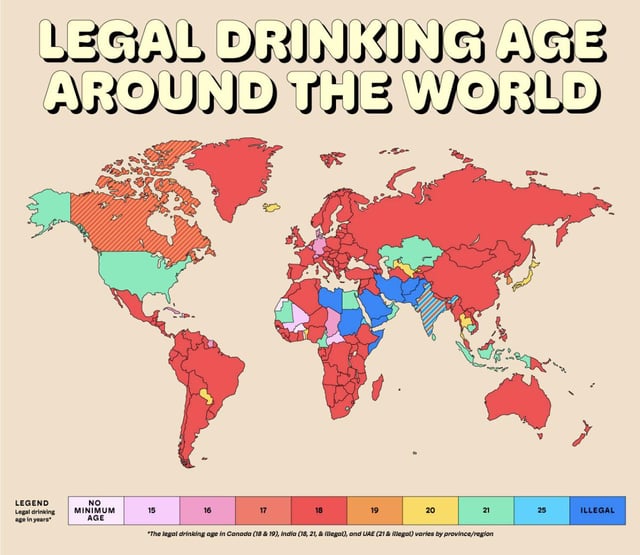Planning a trip to Mexico and curious about the legal drinking age?
Look no further! This guide dives into the specifics of the Mexican legal drinking age, helping you navigate the alcohol laws and ensure a responsible and enjoyable experience. We’ll explore the age requirement, identification checks, and potential regional variations, equipping you with the knowledge to navigate Mexico’s vibrant nightlife scene.
Legal Drinking Age in Mexico
In Mexico, the legal drinking age is 18 years old, and this law applies to everyone, including both locals and tourists. It’s important to carry a valid ID, such as a passport or driver’s license, whenever you plan to purchase alcohol, as establishments are required to check for age verification. Violating this law can lead to fines and penalties.
History of Mexico’s Drinking Laws
Mexico’s drinking age laws have evolved. In the past, some states allowed drinking as young as 16. However, growing concerns about underage drinking and its impact on public safety led to the federal government raising the minimum drinking age to 18 in the 1980s. This change aimed to align Mexico with international standards and promote responsible drinking habits.
Regulations for Alcohol Sales in Mexico
Regulations are in place to ensure responsible consumption and prevent underage drinking. Establishments selling alcohol must hold a valid license. This license is obtained by meeting specific criteria, such as proper facilities, hygiene standards, and responsible alcohol service practices. Additionally, there are restrictions on when and where alcohol can be sold. These limitations may involve specific selling hours or restrictions on proximity to schools and hospitals.
Common Alcoholic Beverages of Mexico
Mexico boasts a diverse range of alcoholic beverages, some unique to its culture. Here are a few popular examples:
- Tequila: The most famous Mexican spirit, produced from the blue agave plant.
- Mezcal: Another agave-based spirit gaining popularity with a distinct smoky flavor.
- Beer: A favorite choice, with Corona and Modelo being leading brands.
- Pulque: A traditional fermented beverage made from the sap of the maguey plant.
- Aguardiente: A sugarcane-based spirit.
- Mexican Rum: Commonly enjoyed as well.
Understanding Mexico’s Drinking Culture
Drinking in Mexico is often a social activity enjoyed with friends and family. It’s common to see people sipping on refreshing micheladas or classic margaritas at restaurants, bars, and social gatherings. Celebrations like weddings, festivals, and holidays often involve alcoholic beverages as well. However, moderation is still encouraged, and responsible drinking is a key aspect of the culture.
Social Norms and Attitudes Towards Alcohol
In Mexico, hospitality is valued, and offering guests a drink is a way to show warmth and generosity. The general attitude towards alcohol is relaxed, seen as a way to celebrate and enjoy life. However, responsible consumption and respecting local customs are important.
Festivities and Cultural Influences
Celebrations in Mexico often involve alcoholic drinks. Traditional beverages like tequila, mezcal, or pulque might be present at weddings, birthdays, and holidays like Cinco de Mayo. The country’s rich history and traditions influence its drinking culture. Tequila, for instance, is a national symbol and is enjoyed in shots or cocktails. Remember, while alcohol is part of these celebrations, responsible drinking is always encouraged.
Enforcement of Alcohol Laws
Local authorities, including police and regulatory agencies, are responsible for enforcing alcohol laws. They monitor consumption, ensure compliance with age restrictions, and crack down on illegal activities like underage drinking or unlicensed sales. Penalties for violating these laws can range from fines to temporary establishment closures. Travelers should be aware of and respect these regulations to avoid legal issues.
Tips for Navigating Mexico’s Alcohol Laws
Here are some helpful tips:
- Know the legal drinking age: It’s 18, and always carry a valid ID for verification.
- Drink responsibly: Avoid excessive consumption and prioritize safety.
- Respect cultural norms: Be mindful of local customs and traditions surrounding alcohol.
Responsible Drinking for Tourists and Expats
- Pace yourself: Avoid overconsumption and potential health risks.
- Stay hydrated: Drink plenty of water alongside alcoholic beverages.
- Plan transportation: Arrange for a designated driver, use public transportation, or hire a trusted taxi service after drinking.
- Be aware of your surroundings: Stay alert, especially in unfamiliar areas.
- Respect local customs: Be mindful of traditions regarding alcohol consumption.
By following these tips and staying informed, you can fully enjoy the unique and vibrant
References:
FAQ About Mexico’s Legal Drinking Age: Navigating Alcohol Laws
Q: What is the legal drinking age in Mexico?
A: The legal drinking age in Mexico is 18 years old.
Q: Can minors drink alcohol in Mexico?
A: Minors can legally consume alcohol in Mexico if accompanied by a parent or guardian and in certain private settings.
Q: Are there any restrictions on the sale of alcohol in Mexico?
A: Yes, alcohol sales are restricted during certain hours, usually late at night and early in the morning.
Q: What are the penalties for underage drinking in Mexico?
A: Penalties for underage drinking in Mexico can vary, including fines, community service, and even arrest in some cases.
Q: Can tourists drink alcohol in Mexico if they are under 18?
A: Tourists under 18 are subject to the same legal drinking age requirements in Mexico. It is important to adhere to local laws and regulations.
Q: Are there specific alcohol laws in certain states or regions of Mexico?
A: Yes, some states may have additional regulations regarding alcohol consumption, such as restrictions on the sale of alcohol near schools or churches. It is advisable to check local laws when traveling within Mexico.


